This article has been reviewed according to Science X's editorial process and policies. Editors have highlighted the following attributes while ensuring the content's credibility:
fact-checked
peer-reviewed publication
trusted source
proofread
Egg 'signatures' allow drongos to identify cuckoo 'forgeries' almost every time, study finds
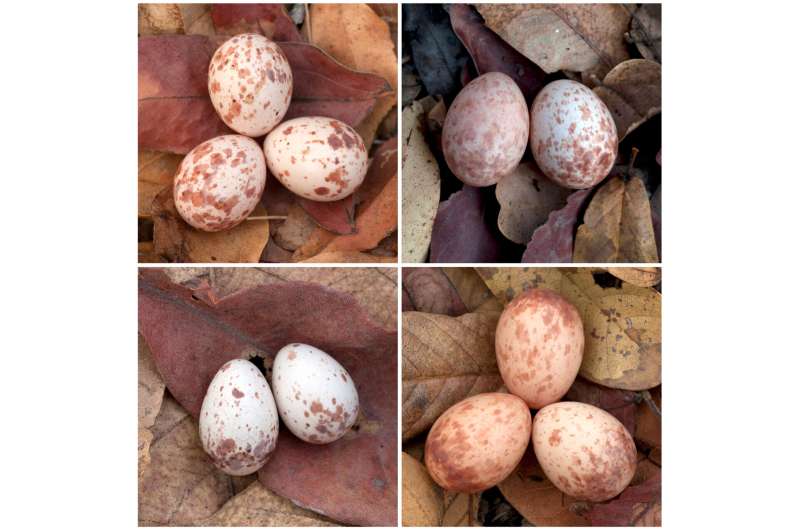
African cuckoos may have met their match with the fork-tailed drongo, which scientists predict can detect and reject cuckoo eggs from their nest on almost every occasion, despite them on average looking almost identical to drongo eggs.
Fork-tailed drongos, belligerent birds from sub-Saharan Africa, lay eggs with a staggering diversity of colors and patterns. All these colors and patterns are forged by the African cuckoo.
African cuckoos lay their eggs in drongos' nests to avoid rearing their chick themselves (an example of so-called brood parasitism). By forging drongo egg colors and patterns, cuckoos trick drongos into thinking the cuckoo egg is one of their own.
But drongos use knowledge of their own personal egg "signatures"—their eggs' color and pattern –to identify cuckoo egg "forgeries" and reject them from their nests, say scientists. These "signatures" are like the signatures we use in our daily lives: unique to each individual and highly repeatable by the same individual.
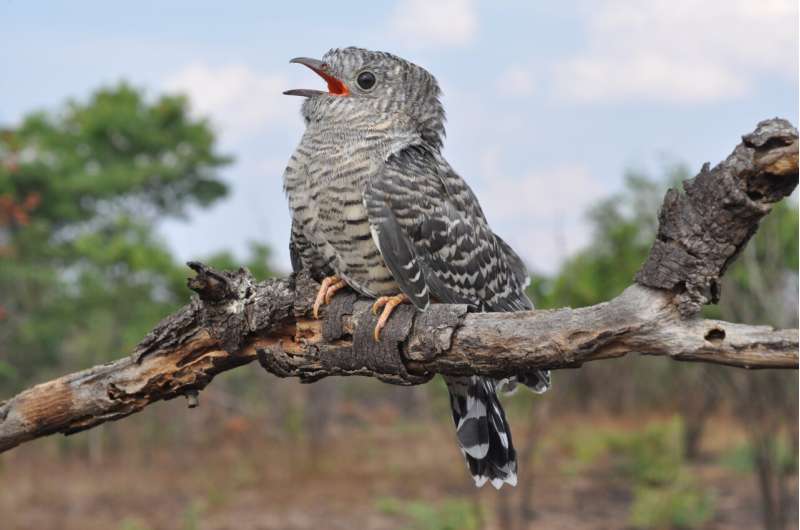
Through natural selection, the African cuckoo's eggs have evolved to look almost-identical to drongo eggs—a rare example of high-fidelity mimicry in nature.
A team led by researchers at the University of Cambridge and the University of Cape Town, working in collaboration with a community in Zambia, set out to explore the effectiveness of "signatures" as a defense against highly accurate mimicry. The findings are published today in the journal, Proceedings of the Royal Society B.
They found that despite near-perfect mimicry of fork-tailed drongo eggs, African cuckoo eggs still have a high probability of being rejected.
Researchers carried out field work in the Choma district of Zambia during September to November across four years. The first step was to measure the differences in color and pattern of the fork-tailed drongo eggs and cuckoo eggs. The team found that the color and pattern of cuckoo eggs was, on average, almost identical to that of drongo eggs, and that all the broad types of drongo egg signatures were forged by the cuckoos.
"It is incredible how perfect the mimicry is. We have occasionally missed cuckoo eggs in the field because they looked exactly like the drongo clutch that they were found in," said lead researcher and Zoology Ph.D. student Jess Lund.
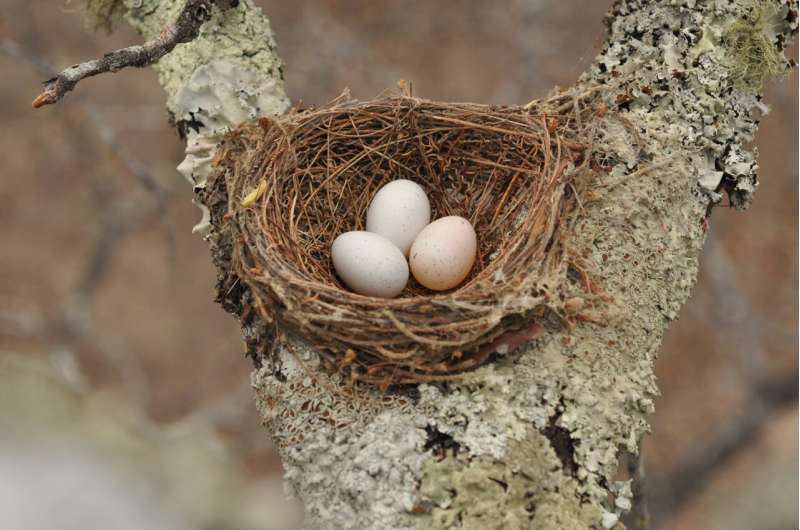
The second step involved "egg rejection" experiments in which the researchers simulated cuckoo visits by "parasitizing" drongo nests with foreign eggs from other drongo nests (as a proxy for African cuckoo eggs). They then checked the nest daily to see whether the drongo parents accepted the foreign egg as one of their own, or realized it was an imposter and rejected it by removing it from their nest. The team could then test what differences in color and pattern between the foreign egg and the drongo's own eggs best predicted whether or not the drongo parents were tricked.
By combining results from both steps of the study, the researchers were able to create a model that predicted how often, on average, an African cuckoo would have its eggs rejected by a fork-tailed drongo host. They found the predicted rate of rejection to be 93.7%.
"We were surprised to see that so many of the cuckoo eggs were predicted to be rejected," said Lund "Our additional simulations show this is likely due to drongos having evolved 'signatures' on their eggs. Even though cuckoos have evolved excellent 'forgeries,' individual cuckoos don't target individual drongo nests that match their own eggs. This means that for each cuckoo egg laid, the likelihood that it will be a good enough match to that drongo's 'signature' is very low."
Fork-tailed drongos have likely honed these signatures and detection abilities through natural selection, explains Lund. "It's very costly for drongo parents if they don't have these skills. If they can't tell a "forgery" from their "signature" their own chicks will be killed by the cuckoo when it hatches, and they will be stuck raising a ravenous cuckoo for a whole breeding season."
-
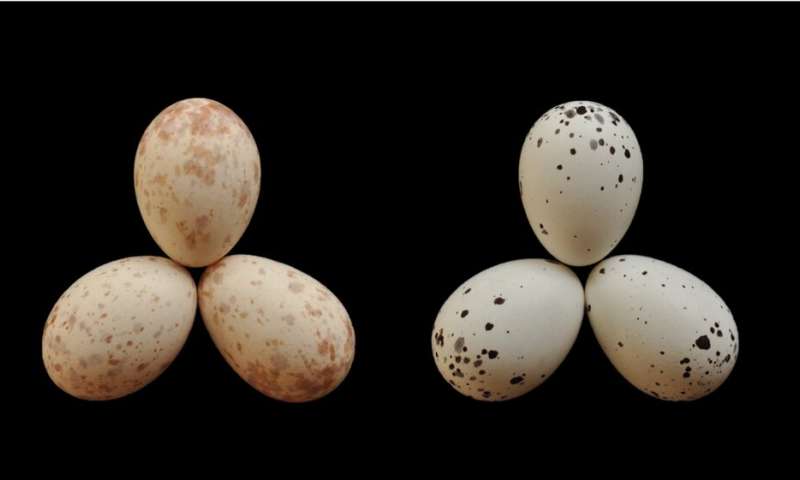
Two drongo clutches parasitised by different African cuckoo females. In each clutch of eggs the cuckoo egg is on the right. Credit: Jess Lund -
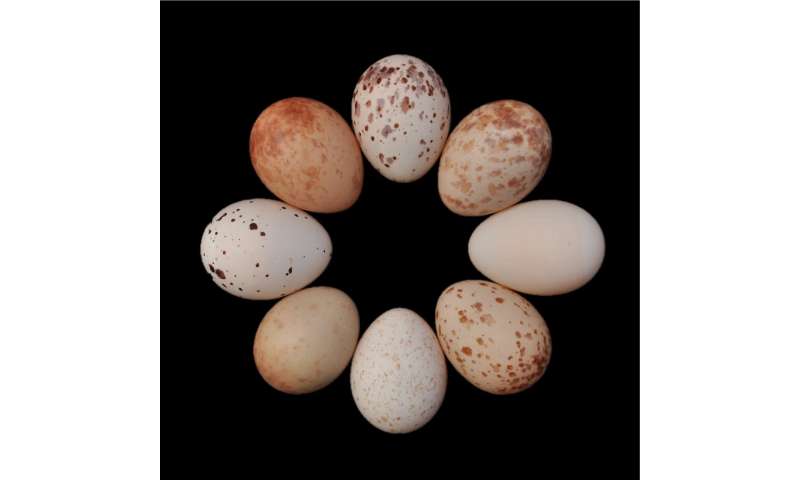
A selection of fork-tailed drongo eggs, each laid by a different female, arranged in a circle. Credit: Jess Lund
The results of the study suggest that a female cuckoo may only fledge two chicks in her lifetime—only just replacing herself and her mate. Researchers say that this would not amount to a sustainable population, which presents a puzzle because African cuckoos remain a common bird in many parts of Africa.
The researchers think that the fork-tailed drongos where the research took place could be particularly good at spotting "forgeries."
"Perhaps this part of Zambia is a hotspot for parasitism, where drongos have particularly fine-tuned defenses, and against which cuckoos stand little chance," said Lund.
More information: Lund et al. When perfection isn't enough: host egg signatures are an effective defence against high-fidelity African cuckoo mimicry, Proceedings of the Royal Society B: Biological Sciences (2023). DOI: 10.1098/rspb.2023.1125. royalsocietypublishing.org/doi … .1098/rspb.2023.1125
Journal information: Proceedings of the Royal Society B
Provided by University of Cambridge



















